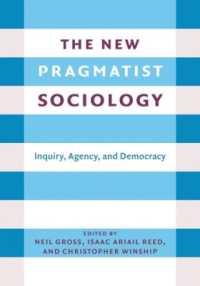基本説明
Provides readers with the knowledge and skill to design, analyse and correctly interpret family-based studies.
Full Description
Family-based studies, including intergenerational, sibling, and twin studies, are increasingly being used to explore life course epidemiology. However, there are issues relating to study design and the statistical analysis of family-based studies that are still not well understood, and comprehending the underlying assumptions of these studies and drawing the inferences from them can be complex.
This book provides the knowledge and skills required to design, analyse, and correctly interpret family-based studies. It explains what these studies can tell us about life course epidemiology; provides practical guidance on how to set-up and maintain birth cohorts for completing family-based studies in life course epidemiology; describes how to undertake appropriate statistical analyses of family-based studies and correctly interpret results from these analyses; and provides examples that illustrate the ways in which family-based studies can enhance our understanding of life course epidemiology. In addition, there is discussion of difficulties specific to setting up such studies in low- and middle-income countries, and issues relating to proxy informants, where parents provide information on children and vice versa, or siblings provide information about each other. Examples of how family-based studies have been used in understanding the life course epidemiology of cardiovascular disease, mental health, and reproductive health illustrate the applicability of the research to these areas, but also more generally to the wider field of life course epidemiology.
Contents
1. Why family matters - an introduction ; SECTION 1: WHAT CAN FAMILY-BASED STUDIES TELL US ABOUT LIFE COURSE EPIDEMIOLOGY? ; 2. Theoretical underpinning for the use of intergenerational studies in life course epidemiology ; 3. Theoretical underpinning for the use of sibling studies in life course epidemiology ; 4. Theoretical underpinning for the use of twin studies in life course epidemiology ; 5. Discussant chapter: summary of the theoretical approaches to family-based studies in life course epidemiology ; SECTION 2: THE PRACTICALITIES OF UNDERTAKING FAMILY-BASED STUDIES ; 6. Theoretical underpinning for the use of intergenerational studies in life birth cohorts: a resource for life course studies ; 7. Family-based life course studies in low- and middle-income countries ; 8. Using available family members as proxies to provide information on other family members who are difficult to reach ; 9. Discussant chapter: the practicalities of undertaking family-based studies ; SECTION 3: HOW TO UNDERTAKE STATISTICAL ANALYSES OF FAMILY-BASED STUDIES ; 10. Statistical considerations in intergenerational studies ; 11. Random effects models for sibling and twin-based studies in life course epidemiology ; 12. Discussant chapter: statistical considerations in family-based life course studies ; SECTION 4: USE OF FAMILY-BASED STUDIES IN LIFE COURSE EPIDEMIOLOGY ; 13. Family-based studies applied to the influence of early life factors on cardiovascular disease ; 14. How family-based studies have added to the understanding of life course epidemiology of mental health ; 15. How family-based studies have added to understanding the life course epidemiology of reproductive health ; 16. Discussant chapter: using family-based designs in life course epidemiology ; 17. The future of family-based studies in life course epidemiology: challenges and opportunities








